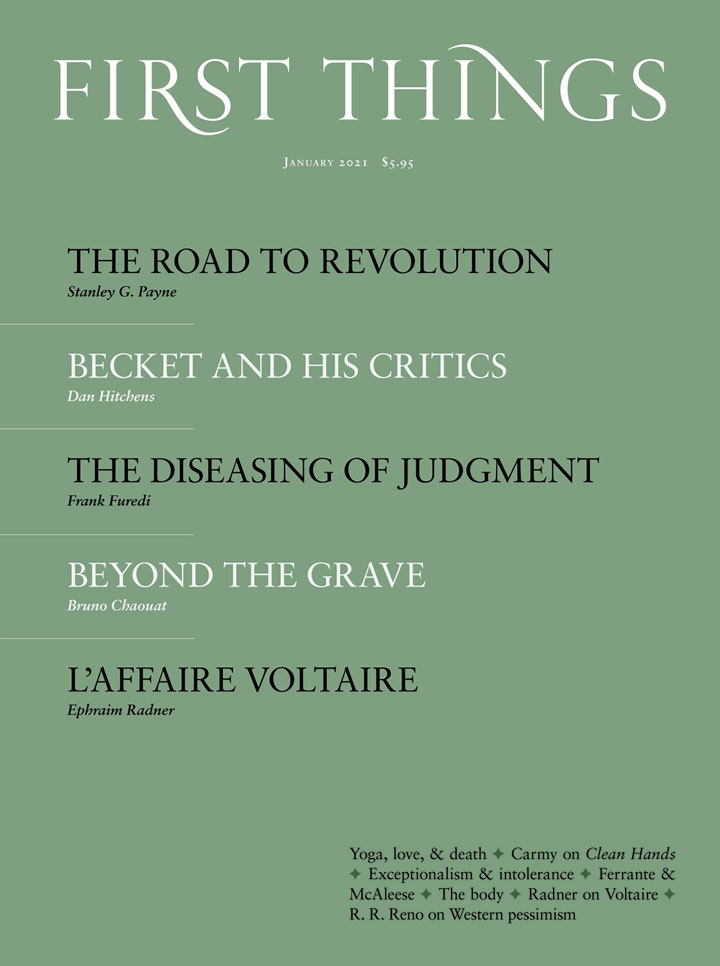Americans know little of Voltaire. French high-schoolers, by contrast, know him the way we once knew Thoreau and Whitman, before social justice eclipsed history as the rationale for our syllabi. Like America’s Liberty Bell, Voltaire’s tomb in Paris’s Panthéon is still visited by school groups and civic pilgrims, who regard his place of repose as the modern nation’s symbolic birthplace. Voltaire fought for “human rights,” the great inscription reads, “broadened the human mind, and taught him to be free.” He employed “reason” to fight for a just society. He was what we now call a “public intellectual,” a man of letters who turns his pen to political causes and thereby “makes a difference.”
Yet “justice” was but a late interest for Voltaire. His famous campaigns for judicial reform and toleration began in the 1760s, following several difficult years. Despite his long and scintillating literary career, the 1750s were a period of gloominess for Voltaire. Émilie du Châtelet, his only true love (he had many lovers, including his sister’s daughter), had died. His attempt to remake himself in Prussia had turned into a financial and personal debacle, estranging him from his friend Frederick the Great and forcing him to flee back to France. He took refuge outside Geneva, ending up in Ferney, a town at the base of the Jura mountains.
Then came the great Lisbon earthquake of 1755. This disaster, with its twenty to thirty thousand dead, was a cultural turning point for Europe. One of her great cities lay in ruins, its people shattered and their cultural treasures consumed by flames. There had been other catastrophes in the era—Lima and (repeatedly) southern Italy. But Lisbon’s destruction, on a brilliant All Saints morning with the populace packed into their churches, shocked the religious and moral imagination. For Voltaire, it crystallized his personal resentments and sorrows.
His “Poem on the Lisbon Disaster” is a masterpiece of furious accusation, the accused being God himself and those who would bow the knee in worship of him. Every traditional appeal to divine goodness, power, and mercy is blasphemous in the face of “child and mother heaped in common wreck.” Voltaire’s poem remains one of the most viciously powerful attacks on “organized” religion on record.
As Lisbon’s rubble was cleared away, Voltaire wearily re-entered the world. His most famous work, Candide, appeared in 1759. The novella is a picaresque depicting one man’s attempt to navigate a world of disaster and cruelty in the face of idiotic appeals to cosmic benevolence. Leonard Bernstein wrote a musical version of the tale. His Broadwayesque take, with lyrics by the likes of Lillian Hellman and Richard Wilbur, is peculiar, but the show captures the bitterness and pathos behind Voltaire’s clipped and jaunty scenes of accumulating human misery. The ending of Candide, when the aged hero and his friends withdraw to Constantinople to “cultivate [their] garden,” reeks of resignation and a desire to be left alone.
Then came the grand rekindling of Voltaire’s dotage: A cause! Suddenly, in the midst of his gardening, Voltaire scorched the political scene of France and staked out his reputation as reason’s deputy of justice. No longer only a cutting commentator on the foolish manners of his day, or the sage popularizer of the new science, Voltaire would save society from its degrading cruelties.
Jean Calas, a Protestant merchant of Toulouse, was condemned to death for the murder of his son. Marc-Antoine had been found dead in the family home, and his interest in becoming a Catholic had purportedly brought upon him his father’s violent wrath. The family originally claimed that an intruder had murdered their son. Then they admitted that Marc-Antoine had committed suicide, and that they had lied to cover up the shame. But witnesses came forward with new claims. Local courts convicted the father, and Jean Calas was tortured and executed in 1762. The family’s wealth was stripped from them. The remaining sons were driven into exile and the girls sent to a convent.
Approached by one of Calas’s friends, and then by one of the sons, who had fled to Geneva, Voltaire decided to intervene. It was a clear case of bigotry against Protestants, and Voltaire’s ire against the Catholic Church, which he blamed for manipulating the justice system, was fanned into a blaze. Pamphlets, briefs, attacks poured from his pen, including the Treatise on Tolerance, which presented the Catholic Church as the epitome of violent prejudice. Mobilizing his friends and contacts, Voltaire succeeded in having the Toulouse court’s proceedings annulled. The French king himself provided compensation to the family.
Other “causes” followed. The mentally ill daughter of another Protestant family, the Sirvens, was found drowned. Authorities implicated the father because he supposedly wanted to keep her from a Catholic convent. The Sirven family fled to safety, but they were condemned to death in absentia. Voltaire took up their case, again with success.
In the north of France, a twenty-year-old youth, François-Jean de la Barre, “free-thinking” and dissolute, was tortured and executed. His crime: disrespecting a religious procession (or perhaps desecrating a crucifix). His body was burned along with a copy of Voltaire’s Philosophical Dictionary, an emblem of the old man’s corrupting influence. Voltaire issued a series of biting attacks on the investigation and trial. He would memorialize de la Barre in a later edition of the Dictionary, in the article on “Torture.” De la Barre was to become a lasting symbol in France of the victims of religious intolerance.
By these interventions, Voltaire invented that political-moral-literary event, “l’affaire,” as it is said in French. An “affaire” takes an emblematic episode—a crime, an accusation, an arrest, a trial, an injustice left unrighted—and uses it to gather popular energies into a transformational moment. The Dreyfus Affair is the most famous in French history. Watergate is an instance from our recent past.
Certainly, there had been literary attempts to shape public opinion before Voltaire. One thinks of Pascal’s Provincial Letters, which helped sharpen educated distaste for the Jesuits and strengthen sympathy for the beleaguered Jansenist party. But these were efforts at elite persuasion, carefully argued and handled with rhetorical finesse. The “affaire,” by contrast, aims not to persuade so much as to engender raw indignation, the fervor of the crowd, so that, in a mounting wave, it overwhelms political deliberation altogether. Voltaire described his strategy in the case of Jean Calas: “My only hope is in public outcry . . . mouth to mouth, ringing in the ears . . . without rest or truce, always crying ‘Calas!’”
Voltaire’s agitation came at the cost of truth. As the legal historian Benoît Garnot has shown, the famous philosophe rode roughshod over the facts of his “causes.” He caricatured the law’s careful and restrained procedures, and he brushed aside inconvenient evidence as he sought to shape images of cruelty and injustice that had as their goal the smearing of the Church. Records show that it was usually the Church that took the lead, before Voltaire joined the fray, in seeking mercy and reprieve. If Voltaire invented “l’affaire,” he did not wield it as a tool of reason. Harnessing the crowd for the sake of righteousness required appealing to passions and manipulating sentiments. Voltaire sought to whip up the “intimate” heart, often through the deliberate distortion of facts. The modern word for such techniques is propaganda.
One can speculate on the wounds Voltaire nursed. He had been sexually abused as a boy by the priests at his school. (“I shall not get over it all my life,” he is reported to have said to Alexander Pope’s shocked mother.) He spent time in prison, was emotionally confused, and abused others, including young women. But this inner damage fueled new energies as he aged. The “affairs” rekindled his fires, giving focus to his fury.
In this he foreshadowed our own time. He seems to have realized that in a God-abandoned world, the public realm is in our hands. It’s up to us to stamp out evil and bring about justice. Voltaire rejected the “interior” life. (Pascal was a fool for lingering there, he said.) We should not concern ourselves with moral questioning, measuring ourselves against the facts of the world and of God. Voltaire wanted to show God up—and replace the divine as the beacon of truth, stirring up the common people to demand justice.
His approach seems unexceptionable in our day. How else to get what is right? Careful argument, facts, demonstrable claims—they take too long, are open to too many questions, and should, at any rate, be assumed (not investigated) by right-thinking people. Social change today is driven by reflex, not reflection, as Jacques Ellul once observed of the “technological” society’s habits of thought, habits suited to the stirring up of public passion. Voltaire’s bitter dismissal, not so much of a sovereign God as of divine sovereignty’s personal relevance, left him unconstrained by humility and honest doubt, and allowed him to pour his rage into the channels of popular opinion. The “public intellectual,” in Voltaire’s modern arena, aims for effect, not truth. We live still in this theater, built upon the ruins of Lisbon.
Shortly before his death, Voltaire received good news about the progress of one of his last “affairs.” He rejoiced: It is as good as any resurrection, he said. I doubt it. The main magistrate in the Calas trial, when all was said and done, committed suicide. For my part, I cannot but think that to push God away, as Voltaire did in anger and bitterness, is not to save reason from its enemies, but to surrender to them.
Ephraim Radner is professor of historical theology at Wycliffe College.
I With You Am
Forty days after his resurrection, Jesus meets the remaining eleven disciples on a mountain in Galilee. He…
Christian Ownership Maximalism
Christendom is gone. So, too, is much of the Western civilization that was built atop it. Christians…
The First Apostle and the Speech of Creation
Yesterday, November 30, was the Feast of St. Andrew, Jesus’s first apostle. Why did Jesus call on…



